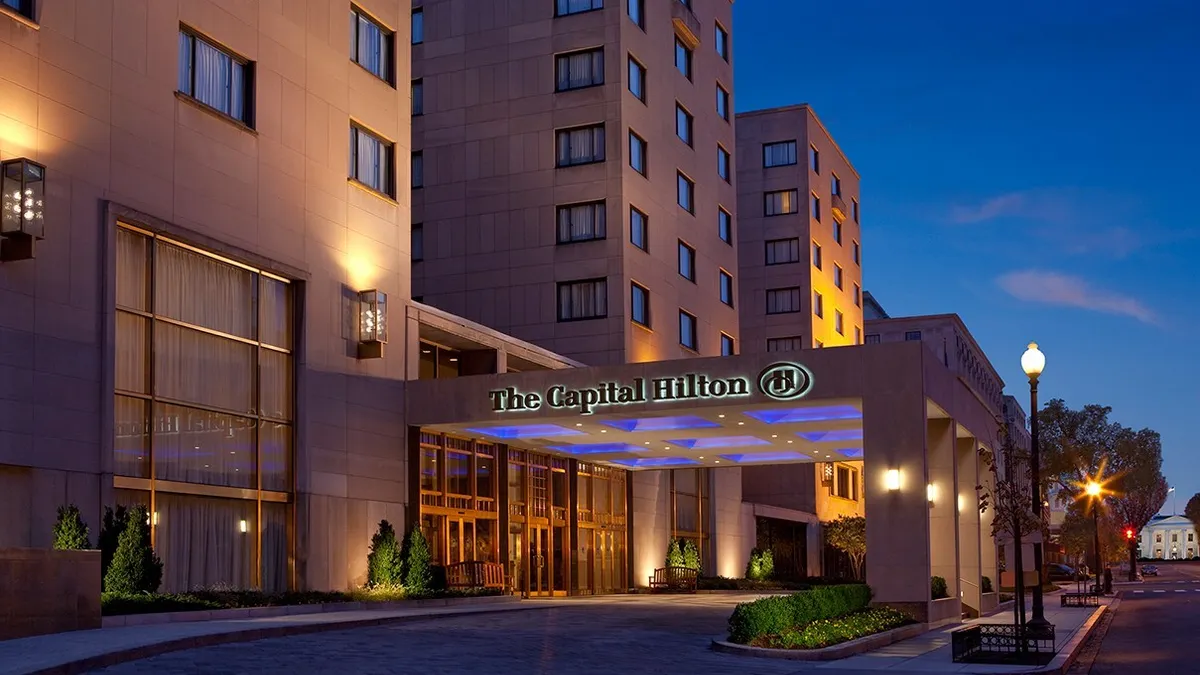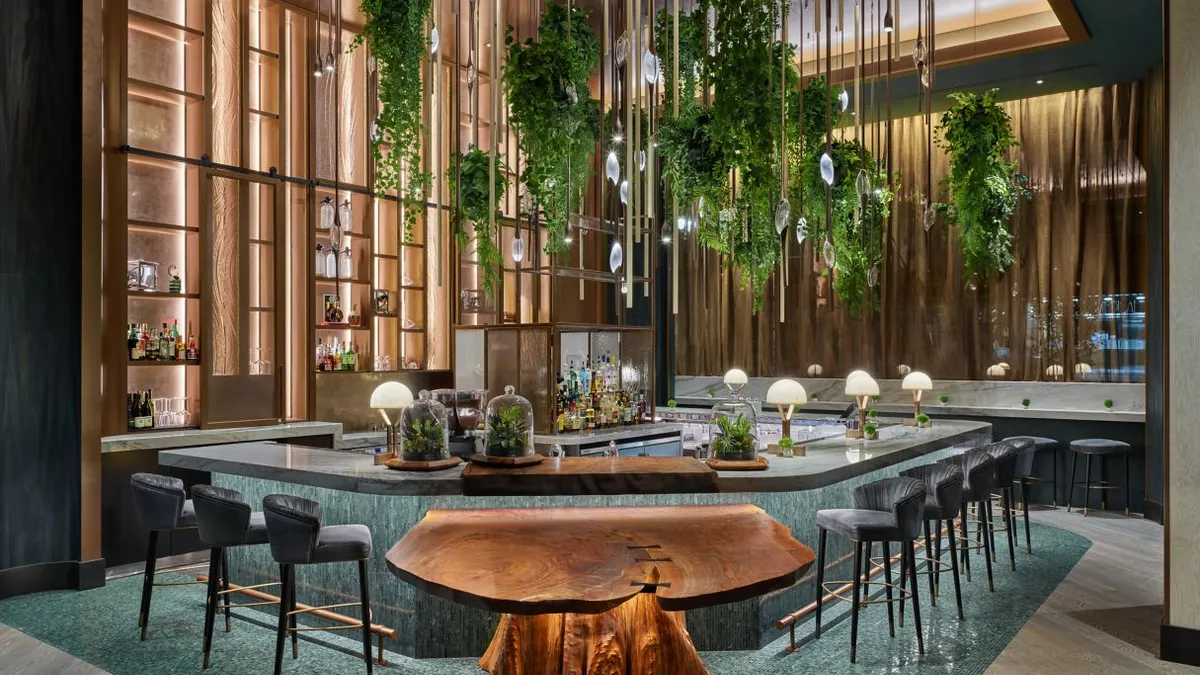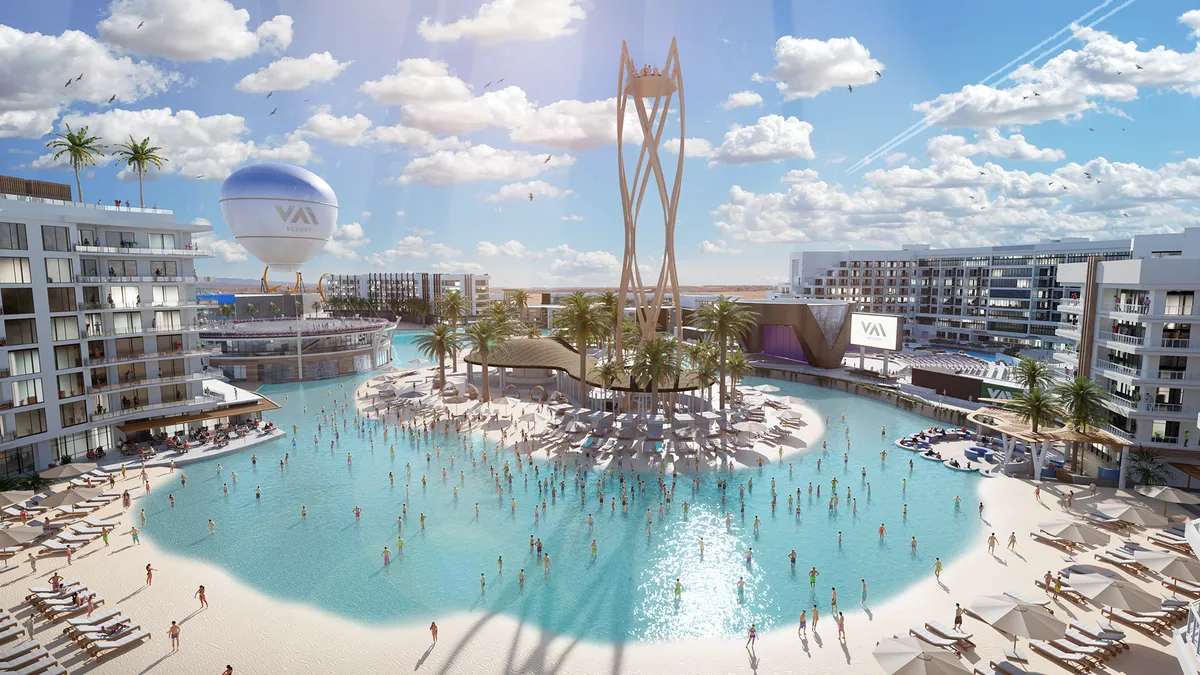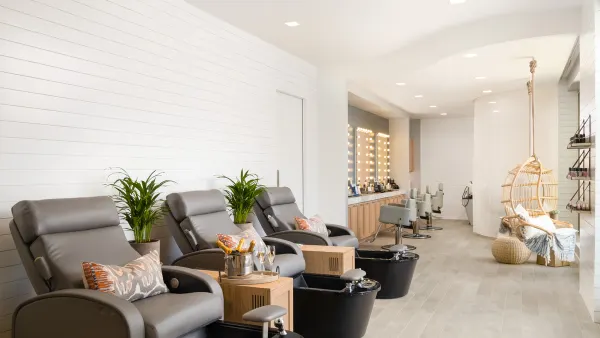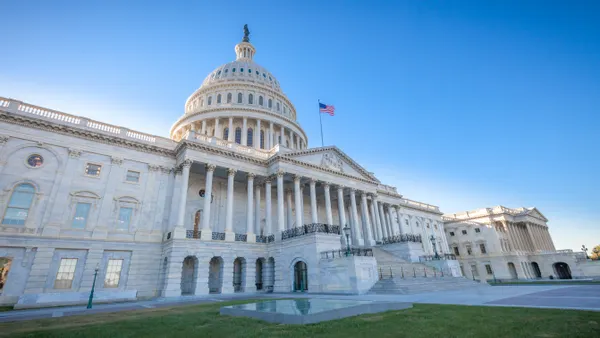2023 was a year of change for hotels. Hotel staff made their workplace demands known in strikes across the country. A tight lending market made it difficult to source hotel construction financing, and technology in the hospitality industry evolved.
Travel demand also shifted, with leisure travelers seeking more experiential trips, and business and group travel ramping up following a pandemic-era slump.
Now, the question begs, how will all this change impact the future of the hospitality industry?
Hotel Dive spoke with prominent leaders in the hospitality industry to find out what trends will drive the industry forward in 2024. They shared insights into hotel workforce management, development, changing traveler behavior, generative AI, hotel sustainability and more.
Integrating generative AI for value creation
In 2024, generative AI will be one of the leading hotel technology trends, with hotels embracing the tech to enhance operational efficiency, create new hotel marketing campaigns and segments, improve employees’ job performance and offer a superior customer experience.
Hotels will implement generative AI into areas such as strategic management, hotel operations, hotel marketing and human resources and talent management, according to Minwoo Lee, associate professor and director of hospitality analytics and innovation at the University of Houston’s Conrad N. Hilton College of Global Hospitality Leadership. Other areas hotels will implement the tech are in revenue management, demand and supply management, accounting, finance and customer relationship and loyalty programs.
The demand for AI shows no signs of slowing and businesses in every industry must react accordingly. [...] Guests and consumers are craving interactive experiences, and with more resources at their fingertips than ever before, their expectations continue to rise.

Eddie Schneider
global brand director at Renaissance Hotels & Le Méridien
Some of the most critical elements that will motivate hotels’ generative AI adoption in 2024, Lee noted, are innovation, performance growth and value creation for various stakeholders in the hotel industry.
Increasing demand for the technology from travelers will further push hotels to embrace generative AI. ChatGPT, specifically, has more than 180 million monthly users and 100 million weekly active users, Lee said, citing DemandSage. The statistics “clearly show a huge demand for generative AI by potential hotel guests,” he added.
Hotels, specifically, may use generative AI to monitor consumers’ online search behaviors, according to Lee. This could optimize room pricing based on factors like demand, supply, seasonality and events, demographics and online search queries, ultimately maximizing revenue for hotels.
Hotels could also use the advanced and automated data analytics functions of generative AI to analyze online reviews, social media posts and customer opinions, in turn discovering new patterns, customer segments and market trends, Lee said.
Additionally, hotels will use generative AI to provide personalized recommendations for activities, restaurants, amenities and transportation. Several prominent online travel agencies are utilizing generative AI for a similar function to simplify the travel planning process. And some hotels are already doing this as well — like Marriott’s Renaissance brand, which recently launched an AI-powered virtual concierge that connects guests with local experiences.
“The demand for AI shows no signs of slowing and businesses in every industry must react accordingly,” said Eddie Schneider, global brand director at Renaissance Hotels & Le Méridien. “One of the biggest evolutions is the growing interest in personalized experiences. Guests and consumers are craving interactive experiences, and with more resources at their fingertips than ever before, their expectations continue to rise.”
While Renaissance is currently piloting a virtual concierge at three of its hotels, Schneider said the brand is targeting more than 20 properties to receive the technology in the first quarter of the year.
Catering to growing numbers of experiential and luxury travelers
Luxury and experiential trips are predicted to lead travel trends in 2024, according to travel tech provider HBX Group.
“This is a trend we expect to see accelerate in the coming years — and is a great opportunity for the travel industry as a whole,” an HBX Group spokesperson said. “[T]here has been a shift towards unique, memorable experiences and travel stands to benefit, with the industry able to offer those once-in-a-lifetime experiences unavailable elsewhere.”
The size of the global luxury travel market is predicted to reach $440.4 billion by 2030, according to Coherent Market Insights. But 2024’s luxury traveler isn’t the same as yesteryear’s.
An October Morning Consult report noted that today’s luxury travelers prioritize great service over luxe amenities. The report also found that hotel marketing is likely to fare better when it moves away from dated language and instead uses words more aligned with the experiential nature of travel, such as “unique,” “personalized” and “authentic.”
That focus on experience is why luxury hotels and lifestyle hotels are increasingly grouped together. According to Jenna Hackett, brand leader at Hilton’s Curio Collection, properties in Curio Collection and Hilton’s broader lifestyle portfolio are focusing on “creating this really high-end experience, but also this experience that can truly be a destination to itself.”
“People still want Instagrammable moments,” she said.
Heightened interest in luxury and lifestyle hotels has led to hotel companies increasing their development in the space. Hilton, for one, expects its lifestyle pipeline to more than double between 2022 and 2032. And Marriott is in the midst of a broader luxury push.
Prioritizing hotel conversion over new construction
A cost-effective and speedy way for hotel companies to scale up their portfolios during a tight lending market, hotel conversion will remain highly desirable in 2024.
In 2023, several major players expanded in the space, with IHG Hotels & Resorts launching conversion brand Garner, and both Marriott International and Hilton reporting that a significant amount of their third-quarter hotel signings and openings were conversions.
Hotel conversions also dominated the U.S. hotel construction pipeline in the latter half of 2023, with conversion project counts reaching record highs in the third quarter, according to Lodging Econometrics. That momentum will only accelerate moving into 2024, Lodging Econometrics SVP Bruce Ford said.
While the fourth-quarter 2023 pipeline numbers have not yet been calculated, Ford said he expects the conversion pipeline “absolutely continued to grow” in the quarter and will continue to do so into 2024.
Hotel conversion will remain one of the fastest ways to grow portfolio scale, at least until the hotel construction financing environment loosens (which Ford predicts is possible in the second half of 2024), and hotels can expect to continue to sign new conversion locations, Ford said. He added that he wouldn’t be surprised to see more conversion-oriented brand launches throughout 2024.
Marriott is one company set to continue capitalizing on conversion signings this year. Noah Silverman, the company’s chief global development officer for the U.S. and Canada, said, “Conversions are a high priority and will remain a successful part of Marriott’s rooms growth strategy.”
Marriott is also working on a significant conversion project in Las Vegas, Ford highlighted, in which it will convert some 31,000 rooms at MGM properties in the city under the Marriott reservation system.
As part of the partnership, Aria Resort & Casino will convert to Marriott’s Autograph Collection, The Bellagio Resort & Casino will join The Luxury Collection and Park MGM will become part of Tribute Portfolio. The remaining MGM properties will be converted to a white-label brand, MGM Collection with Marriott Bonvoy. This conversion process is expected to kick off this month, Ford noted.
Keeping workers happy – and on the job
2023 was the year hospitality worker unions ramped up activity. There were strikes in Southern California and Detroit, threatened strikes in Las Vegas and demands from workers elsewhere that hotel management raise wages and reduce workloads. What’s more, the National Labor Relations Board’s joint-employer rule means that more than just individual franchise managers will be tasked with hotel workforce management.
The rule, which would go into effect in February if it stands, would consider two employers using the same employees — such as a franchisor and a franchisee — jointly responsible for staff management issues.
"If the [NLRB]’s ruling on joint employer status stands, larger hotel chains will have to get more involved at the property level on all things concerning employees,” said Scott Greenberg, author of “Stop the Shift Show: Turn Your Struggling Hourly Workers Into a Top-Performing Team.”
Managers will need to better lead their people, rather than just run the hotel.

Scott Greenberg
author of "Stop the Shift Show: Turn Your Struggling Hourly Workers Into a Top-Performing Team"
Worker satisfaction, of course, is one of the best ways to stave off labor disputes. In 2024, managers in charge of hotel operations will work harder to ensure staffers are happy with their roles. “[G]overnment policy is nowhere near as effective as organizational culture,” Greenberg added. “Those brands who truly commit to making the employee experience as good as the guest experience will have a competitive advantage in recruiting and retaining team members. That means managers will need to better lead their people, rather than just run the hotel."
In 2023, hotel companies launched initiatives to attract and retain talent that will continue into 2024. Hilton launched the “Every Job Makes the Stay” employer brand campaign in May, which Hilton CMO Mark Weinstein previously told Hotel Dive will continue for the foreseeable future. Meanwhile, Marriott’s 2023-launched people brand, Be, is helping the hotel company empower its associates to fulfill their career goals.
However, the multihotel nature of Southern California’s hotel strikes means that, even though some hotel walkouts are over, others have just begun. And though MGM Resorts International, Wynn Resorts and Caesars Entertainment avoided walkouts on the Las Vegas Strip in November, the Culinary Union recently set a February strike deadline for 21 more properties on the Strip and in the city’s downtown.
Fostering the recovery of business travel
The pandemic and remote work didn’t spell the end of business travel. They just changed it.
While hybrid work models mean that single-purpose trips are becoming less frequent, 2024 could be a banner year for the meetings industry, according to hospitality technology and intelligence provider Knowland.
Corporate meetings are a stabilizing force for hotel revenue, significantly outperforming other segments, including business travel.

Jeff Bzdawka
CEO of Knowland
Corporate events in particular are resurging. In 2023, Knowland saw a 10% increase in U.S. corporate events volume as well as a 12.3% climb in the country’s top 25 markets.
“Corporate meetings are a stabilizing force for hotel revenue, significantly outperforming other segments, including business travel,” Knowland CEO Jeff Bzdawka said.
High ADRs may hinder a complete business travel recovery in 2024, Bzdawka warned. However, ADRs also led to a strong third quarter of 2023, with business travel 86% recovered, according to the Knowland-Amadeus Hospitality Group & Business Performance Index.
“In 2024, the challenge for hoteliers will be to balance the allure of higher rates with new business goals,” Bzdawka said. “Sales intelligence will be an important tool in helping to speed customer acquisition and conversion rates for business travel revenue.”
Furthering transparency around hotel fees
Following momentum gained in 2023, this year will see heightened activity around anti-junk fees legislation.
Though there’s still debate over which fees are “junk” — or whether that’s a fair term for hotel “resort fees” at all — hotel laws and regulations are heading toward requiring companies to advertise room rates more transparently, regardless.
In July, California’s Senate Bill 478 will go into effect, requiring businesses, including hotels, to advertise costs with all fees upfront. State officials say it will be the nation’s strongest anti-junk fees law.
But the law will impact more than California hotels. According to Bryan Mohler, a partner at law firm Pryor Cashman’s Real Estate, Hotel + Hospitality and Litigation Groups, the regulation will “apply to anyone that does business such that it would touch a California consumer.” That means even hotels on the other side of the country could be penalized if their rate advertising doesn’t align with what is required under California law, “because hotel companies rent broadly.”
Additional legislation is underway, as well. An anti-junk fees bill is currently working its way through Pennsylvania’s state legislature, as are two similar bills in the U.S. Congress. And Marriott has already reconfigured how it advertises room rates in response to a lawsuit in Pennsylvania. Several similar lawsuits are underway elsewhere, Travelers United attorney Lauren Wolfe previously told Hotel Dive.
Expanding the national electric vehicle charging network
Another top hospitality trend of 2024 will be the deployment of electric vehicle charging stations at hotels. The national EV charging network is expected to grow, with help from hotels aiming to meet sustainability goals and increasing guest demand for more sustainable hotel options.
Several hotel companies, including Hilton and Marriott, have already partnered with EV charging providers to grow their properties’ charger networks. As 2024 gets underway, Hilton will officially start rolling out these charging stations.
Hilton will begin installing up to 20,000 Tesla Universal EV Chargers at 2,000 of its hotels in the U.S., Canada and Mexico this year.
According to Lara Hernandez, senior vice president of global brand strategy and innovation at Hilton, guest demand for EV charging is bolstered by a growing number of consumers hitting the road in the eco-conscious cars.
From 2011 to 2021, the number of EVs on the road jumped from about 22,000 to a little over 2 million, or by roughly 9,081%, according to a report by the U.S. Bureau of Labor Statistics. Looking forward, S&P Global Mobility forecasts EV sales in the United States could reach 40% of total passenger car sales by 2030, the report detailed.
“More and more, we know our guests will require EV chargers, so that’s where we want to be,” Hernandez said.
Hotels will also turn to EV charging deployment in 2024 to hit hotel sustainability goals. Marriott, for instance, has made EV charging a priority at its hotels and corporate offices in an effort to source a minimum of 30% of its overall electricity from renewable energy by year-end 2025.




